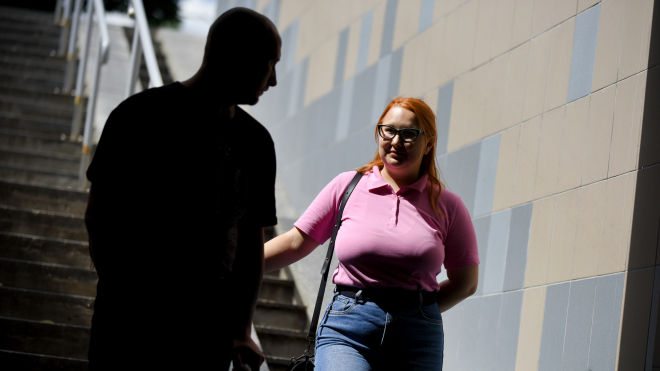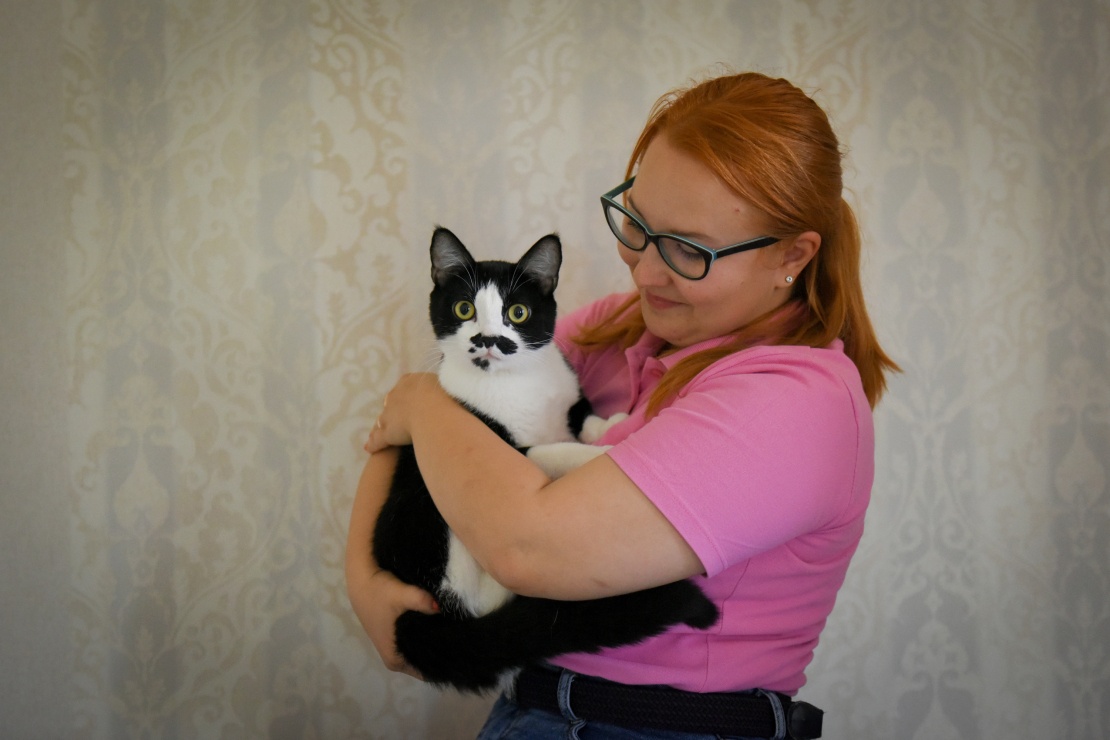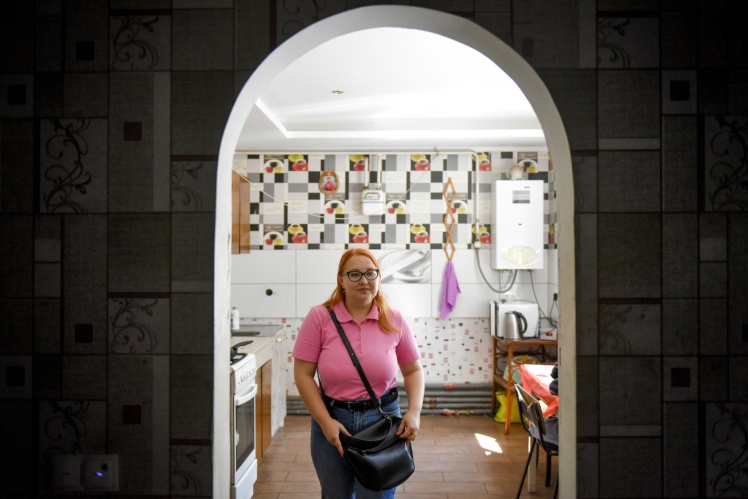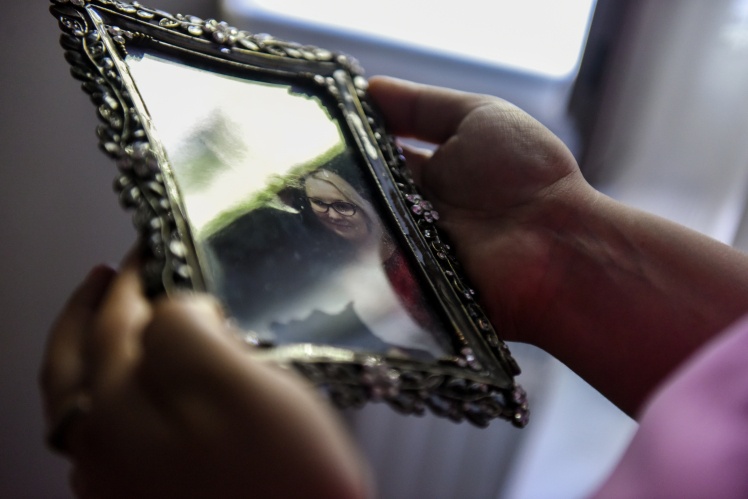1
Valya and Vitalik have been in Chernihiv for a week. They lost their Mariupol home four months ago. All the belongings they have now are jeans and pink polo of the red-haired and short Valya, shorts and two black T-shirts of her stocky fiance Vitalik.
“I bought a polo here in a thrift shop. For 50 rubles...”, Valya cuts herself off mid-sentence and laughs. “Well, I still say "rubles". For 50 hryvnias.”
There is always mud in front of Valya and Vitalikʼs temporary home — cars stop at the nearby service station, and the ground does not have enough time to dry. Territorial Defense members lived here before them.
As soon as we enter the house, the black and white cat Charlie runs away — he still hasnʼt recovered from what he experienced in Mariupol.
Oleg Petrasyuk / «Babel»
"When we took him from the shelter, he was also very scared," says Vitalik. “He was born on the street, bit by dogs. Poor child, in short.”
The second cat remained in Mariupol — Valya gave it to a boy who spent a week crying over the ashes of the cat that burned in the basement.
The only furniture in the dark room is a bed with a childrenʼs blanket and a table. On it, among the few belongings, is a photo in a forged frame with shiny flowers. The only joint photo that Valya took from Mariupol. The frame was presented by Vitalikʼs mother — she came to them from time to time from her native occupied town near Donetsk. Now she is in the next room with her youngest son.
Oleg Petrasyuk / «Babel»
After lunch, the four of them go to the volunteer to get clothes and shoes.
"Itʼs very embarrassing to ask for help," says Valya. She smiles and cries at the same time. “We are used to a good life, we are used to making enough money. And now you have to start living anew, and so far itʼs not working out very well.”
2
Vitalik planned to resign from the Mariupol police on February 28. On the night before the February 24, he was on duty in the Skhidny neighborhood. There he saw the first shelling and at five in the morning he called Valya — told her to pack an emergency backpack.
"I packed it, but we didnʼt go anywhere," Valya recalls. “First we didnʼt want to. And when we wanted to do it, it was already impossible.”
Valya and Vitalik lived with his younger brother Vlad, who left the occupied territories a year before and went to high school in Mariupol. The food supplies for the three soon ran out, so they went under fire to Myrnyi settlement, where Valyaʼs parents lived — they hoped that it would be easier in a private house. However, it got worse: the Russians shelled nearby factories, dropped aerial bombs, and destroyed several nearby buildings. The family spent ten days in the warehouse of the Ilyich steel mill. When they ran out of food, they returned to their settlement. Then Russians started taking men away.
Oleg Petrasyuk / «Babel»
On April 14, the Russians came to the house of Valyaʼs parents and ordered her father and Vitalik to get packed. They promised to bring them back in a few days. But Valya and Vitalik saw each other only a month later.
"I thought that Vitalik and dad were together, it was a little reassuring," Valya recalls. “And when the father called a week later from the camp in Bezimenne, it turned out that they had been separated on the very first day.”
3
Vitalik and his father-in-law were taken by the so-called "DPR" “militia” to the administration of Myrnyi settlement, where they brought all the local men. Two "militia employees" examined the undressed prisoners for tattoos or machine gun marks. Seven people, including Vitalik, were taken to Sartana — to a larger headquarters located in the premises of a former cafe. There, six "policemen" interrogated people, asking about the name, work and home addresses. From there, the father-in-law was taken to Bezimenne, and Vitalik with three other law enforcement officers were sent to Novoazovsk. The occupiers tied their hands with tape.
They spent in a cell two days. Once they received two jars of porridge. The interrogation was more detailed — the occupiers wrote down where each of men studied and worked or served.
"But they behaved normally," says Vitalik and smiles. “Itʼs when they brought us to Donetsk, it became more interesting.”
"Convoy" took Vitalik and 10 more Mariupol law enforcement officers on the evening of April 16. This time, the hands were again tied with tape, and the eyes were covered with either the hood or a piece of paper. In an old police car typically called “bobik”, the men spent two hours, standing on their knees.
“Then we were pulled out of the car. They beat me a little,” Vitalik laughs again. “They aimed at the legs, kidneys, hands. It didnʼt last for long: they have not yet asked who we are, but have already beaten us. Preventively.”
They, as well as prisoners of war, were brought to the Donetsk "UBOP", police headquarters. The “militia men” put prisonersʼ faces against the wall, without releasing their hands and eyes. They beat them and then asked where they work. Vitalik was additionally beaten seven times for the seven Christmas trees on the tattoo. Then police officers were separated from prisoners of war. Then the occupiers checked the data from the local “militia” branch and offered to go over to the side of the occupiers.
Oleg Petrasyuk / «Babel»
Vitalik and two other policemen spent the next two days in a prison cell as officially detained. The cell was actually designed for three people, they were fed three times a day — Vitalik says that wheat porridge and meatballs werenʼt bad. Everyone was given a quarter of a loaf of bread for the meal. The detained were allowed to wash. They werenʼt beaten. Though no walks were allowed, though they should have them.
“On the last night, two more soldiers and one civilian were accommodated with us. But the beds were wide enough for two people,” says Vitalik. “The military were reserved, young guys.”
At three in the morning, a van came to pick up the men to take them to Olenivka. Everyone was taken out through the corridor by "convoyers" who beat them with sticks and feet. It was necessary to run between them and sit down near the gate. They were beaten there too — Vitalik was hit on the head.
The colony itself is divided into two sectors — more comfortable barracks with sleeping places, a toilet and the possibility to go out for a walk, and disciplinary isolators with closed cells for 6 people with a single window. The prisoners were taken to the second sector.
In the hallway on the first floor, they were placed facing the wall, forced to raise their arms and lean on the outside of their palms. They had to stand like that for two hours. Those who tried to knead a stiff arm were beaten with a stick.
Everyone was called to the office one by one, where the "doctor" ordered to undress naked and squat down so that nothing inside the body was brought into the colony. It was necessary to go to the cells naked through the yard at a temperature of 8-10 degrees Celsius.
“I freaked out a little, because there were already 42 people in the cell 3 by 4 meters when I entered. It turns out that this is possible,” says Vitalik. “The bunks were cut from the walls, and sometimes we slept just on the floor. There was no fresh air.”
There was no daily routine — the occupiers only counted the prisoners in the morning and in the evening, taking them out into the corridor. Once every two days, they were taken out for half an hour to a cage in the yard. They were interrogated only by employees of the so-called “DPRʼs Ministry of State Security". They were fed two or three times a day — in particular, wheat porridge with boiled rotten fish, cutlets from the same fish, transparent "borshch" without any nutrients in it. The best dinner was on "Republic Day", May 11 — then rotten meatballs were served with buckwheat. Vitalik ate only bread and drank water, sometimes he shared with his neighbors the food provided by his relatives — Mivina instant noodles, canned meat stew, condensed milk, tea. Everyone shared everything and ate at the same time so as not to tease each other. They also smoked one cigarette for three.
Every morning and every evening, the "supervisors" turned on the "DPR" anthem. There also were Russian news and Russian music every day. On walks, they were convinced that the local “militiamen” had high salaries and that they should switch to the side of the "DPR" because Russia had seized all of Ukraine. Vitalik didnʼt believe it — from time to time shells fell nearby, which meant that the fighting was going on. The only thing that shook his certainty was the accusation of treason. One of the "supervisors" was convinced that Volodymyr Zelensky said that all those who remained in occupied Mariupol were traitors. The cellmates sometimes talked about it in fear, and Vitalik began to suspect that in Ukraine he would get into prison as well. Moreover, in the first days of captivity, he was forced to sign a statement about "cooperation with the DPRʼs militia."
Oleg Petrasyuk / «Babel»
Books helped Vitalik not to lose his mind. For example, the book about the search for fascists in Kyiv in 1945 and "The Last Night in Ciudad Trujillo" about the Cuban dictator. From the last one, one phrase stuck in his memory: "Innocents should sit in prison, so that later they are afraid to get into it."
Neither the books, nor the playing cards made from the tea boxes, nor the checkers and dice from the bread were taken away by the "supervisors". Vitalik assumes that this is how they wanted to appear "normal" so that the law enforcement officers would switch to their side. But the soldiers had no such privileges: they werenʼt allowed to receive food from the relatives or communicate, sometimes they were left without water and food. There could be up to 70 people in the cell, who were standing or sitting all the time. Among the prisoners of war were men and women from various structures of the Ukrainian Armed Forces, and the Azov soldiers were treated most harshly.
"They were tortured with a stable periodicity," says Vitalik.
The soldiers were taken out into a common corridor and forced to sing the national anthem of Russia, "Katyusha" and "Moldavanka" Soviet songs. Once, through a window for plates, Vitalik saw how a boy who laughed at the song "Sho vy patsyky na motsykakh" was kicked with the leg in his chest. Sometimes Azov people were taken out of the cells just to be beaten. They were also forced to clean toilets with their hands.
Women were kept separately. Unlike men, they were allowed to shower. From time to time, doctors from Azov were given packages with iodine, bandages, analgin and aspirin for medical examination of prisoners. The only treatment that Vitalik was able to receive while having a gumboil was a quarter of an analgin pill.
During the first 15 days, the number of prisoners only increased. And then there were rumors that they would soon be released: places for detention were running out, and now the filtering for policemen took just an hour, and the prisoners of war were being transferred to Yenakieve, Taganrog and Rostov-on-Don.
Vitalik spent 30 days behind bars. He left the colony on May 17.
4
"You already washed in Donetsk, but I didnʼt at that time," laughs Valya.
When Vitalik was taken from Donetsk, she was still in Mariupol. Valya went to the occupied town where Vitalikʼs mother lived at the end of April. As soon as she got into the car at the station, she started crying because she came there without Vitalik, and couldnʼt stop until she started unpacking. Valya thought only about saving Vitalik, so she started looking for him in all the institutions of Donetsk.
Vitalik had no idea about this. He wrote seven letters and tried to pass them on through those who had come out earlier — some were taken from him during the inspection, some of the released ignored the requests. Out of seven letters with phone numbers and an address in Mariupol, only one has passed the security. At the beginning of May, a stranger called Vitalikʼs mother and said that her son was in the colony.
Oleg Petrasyuk / «Babel»
Valya and her mother-in-law took a car and went to Olenivka. Under the colony fence, the wives of the other detainees, who had been sent there earlier, were waiting. Someone filled out a transfer form, others had the opportunity to talk on the phone, and someone was asked to bring building materials for repairs — for this, the prisoners were allowed to live in better conditions.
The bag with food and other goods was taken from Valya and her mother-in-law, but they said that Vitalik was not in the colony. Other women were assured that their loved ones were there. So in a few days, Valya went a second time and again heard "search further". To find out, the went to the Donetsk detention centers, but Vitalik was not there either. Finally, on May 10, she was confirmed that Vitalik was still in Olenivka.
Vitalik was released on May 17. Intentionally in the evening, so that he could not get to Donetsk to get the document about passage of the filtration. The men who left the colony stayed overnight in the gazebo nearby, and were taken away for several days by the "patrol" for breaking the curfew.
Vitalik and three other men left the colony around seven in the evening. The only bus went to the center of Olenivka, where they spent the night in an abandoned underpass. In the morning, they went to Donetsk with the money from a stranger — the colony authorities said that with documents about filtration one would be able to travel for free, but it turned out to be a lie. In Donetsk Vitalik had the documents returned and a certificate of filtration was issued to him.
"I didnʼt know that Valya was not in Mariupol — I couldnʼt call, because everyone already had new Phoenix numbers," says Vitalik. “Thatʼs why I went to Volnovakha together with the other freed men. Of course, Volnovakha no longer exists.
From there, the wife of one of the men took them by car. Vitalik got to the house of Valyaʼs parents in Myrne already in the evening. The village was quiet and empty.
"My mother-in-law was having dinner with the neighbors when I knocked on the window," Vitalik recalls. “She said later that she thought it was some Chechen. I was bald, with a beard and a swollen cheek. And when she recognized me, she started sobbing. And I didnʼt cry — I didnʼt understand where everyone was.”
Vitalik was sure that Valya would be waiting for him at home, but he was not surprised that she herself took his underage brother near Donetsk and began the search. That same evening, they spoke on the phone for the first time. Vitalik spent another three days in Mariupol. He immediately burned the clothes he was wearing in the colony.
5
When Vitalik came to the family, Valya did not recognize him — he was a quiet, faded man. Together they went to his hometown near Donetsk.
"I didnʼt know what happened to him," she says. “But I imagined terrible pictures. And I was afraid to ask. The first night we went to bed together, and he curled up on the edge of the bed and screamed in his sleep. Thatʼs why we didnʼt ask him anything for a week or two, we just surrounded him with care.”
Vitalik could not go anywhere in this condition. He was at home for the first time in 8 years and finally showed his hometown to Valya — although they had planned that this would happen after the de-occupation of Donetsk oblast.
Oleg Petrasyuk / «Babel»
"I was waiting for what Vitalik would say," continues Valya. “Honestly, I even assumed that we would stay in the DPR if he was forced to work here in the "militia". After what weʼd been through in Mariupol, the appearance of stability didnʼt seem so bad — although thatʼs a thought Iʼd never had. But I really didnʼt want to stay in the DPR.”
However, Vitalik got better, and they decided to leave the occupied territory. The only option was through Russia. Valya started asking acquaintances who were leaving, and she was advised of Russian volunteers who cooperate with Belarusians and Poles. So they took a risk and, without telling anyone, left for Rostov-on-Don, where they boarded a train to Moscow. Everywhere they saw signs about the victory in 1945, the USSR and Z symbols.
In Moscow, a volunteer met them, took them to an apartment for rest and lunch, gave them a suitcase, where the family put their belongings. Another volunteer took them to the bus that was taking people to Europe. Already in the cabin, the volunteer coordinator asked not to tell the police or border guards that the bus was a volunteer one, and the bus left for Brest, and from there to Poland.
Valya and Vitalik felt more relaxed only in Poland. All the way, they assured the volunteers, just in case, that they would stay in the EU, even though they planned to go to Ukraine right away. So that same evening they got on the bus and crossed the Polish-Ukrainian border.
"I congratulate us," was all Valya said.
6
“I would like to return to the police. To Pokrovsk, where everyone from Mariupol works now,” says Vitalik and looks slyly at Valya.
She, very small next to him, also laughs.
"Youʼre happy because I donʼt argue anymore," he answers.
They came to Chernihiv because Vitalik was offered a job here. He planned to change his profession in March, but after what he experienced, he reconsidered his attitude towards the police — and the desire for revenge does not leave him.
Valya is afraid to return to Donetsk oblast. In Chernihiv, she is offered to work as a journalist for 7,500 hryvnias per month, she has no other options yet. She no longer wants to part with Vitalik, so if he goes to Pokrovsk, Valya will join the police press service. In the meantime, she is completing the documents as a forced migrant and dreams of the wedding, which they had previously postponed.
Oleg Petrasyuk / «Babel»
Valyaʼs mother went to a close friend in Russia, and her dad stayed in occupied Mariupol. Before the bus left, mother gave Valya a ring with white and black stones, and kept the same earrings for herself. Valya, formerly rational and pragmatic, began to believe in signs — she says, this is their connection.
And Vitalik wears a red ribbon on his wrist — his mother tied it for good luck back in the "DPR". Before that, he had to be protected by a bracelet that was taken during the interrogation in Novoazovsk. As a habit, he always carries a certificate of release from the colony with him, as well as a short letter that he never received from his relatives. Valya gave it to him already in the car in Amvrosiivka. "Zaya, I love you. Bigger than life — and stronger every day."
Valya says that they canʼt make a good life in Chernihiv. Therefore, she thinks this could be a sign to look for a new home elsewhere. Vitalik does not care where to stay — as long as he is within the borders of Ukraine. Heʼs Russian-speaking, but enjoys Ukrainian on the streets. Here he feels freedom.
"I donʼt care what city Iʼm in," he says. “In Ukraine, I am at home everywhere — because this home is in me.”
***
Already after our meeting, Valya was offered a job in Khmelnytskyi city. On the phone, her voice finally sounded joyful — they are moving.
Translated from Ukrainian by Anton Semyzhenko.
Protect your sense of home and your reliable media — support Babel: Patreon 🔸 [email protected]🔸donate in cryptocurrency🔸in hryvnia.




